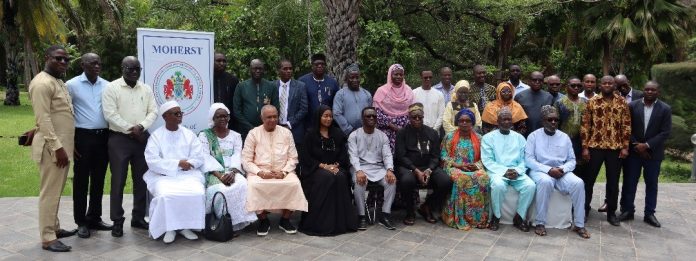By Mariama Marong
The Ministry of Higher Education, Research, Science and Technology has recently convened a three-day second quarter sector retreat with higher education experts at Sindola Hotel in Kanilai. The retreat was held under the theme, “Accelerating Transformation: From Commitments to Impact.”
“Our theme for this retreat, ‘Accelerating Transformation: From Commitments to Impact,’ signals a decisive shift, from deliberation to delivery, from aspiration to action, and from policy frameworks to lived realities,” said Professor Pierre Gomez, Minister of Higher Education, Research, Science and Technology.
Professor Gomez described the gathering as a historic meeting and a bold step toward redefining how higher education is governed, funded, and developed in The Gambia. “It yielded a comprehensive set of 23 resolutions focused on institutional accountability, digital transformation, governance, performance management, and sustainable development,” he added.
The Minister said that with the establishment of a cross-institutional Key Performance Indicators (KPIs) Framework and performance contracts, clear expectations and measurable targets were set. He added that the bar was raised, and rightfully so, because the development of any nation rests squarely on the capacity, quality, and innovation of its higher education and research systems.
“Today, nearly six months later, we are called upon to answer a simple but weighty question: Have we delivered on what we promised?” he asked.
Professor Gomez noted that the retreat is not merely a review meeting. It is a strategic checkpoint, a space to take stock, reassess their direction, and make informed adjustments as they navigate the second half of 2025.
He said the primary objectives of the retreat are to evaluate institutional progress against KPIs and the February resolutions, to identify and resolve implementation bottlenecks, to recalibrate strategic priorities in line with current realities, and to strengthen stakeholder alignment across our ecosystem.
The Honorable Minister said they must be bold in self-assessments and courageous in correcting course. He said education officials must treat accountability not as a bureaucratic exercise but as an ethical imperative.
Notably, he asserted that they must examine full transparency in the status of ERP systems and digital learning platforms, progress of institutional accreditation and the National Qualifications Framework, evolution of their performance contracts, the alignment of their budgets with strategic priorities, and the real-world impact of research and innovation initiatives.
Minister Gomez called on the need to be agile in responding to new technologies and global trends. He also emphasized embedding AI, green technologies, and gender equity in higher institutional blueprints.
Mrs. Jainaba Jagne, Permanent Secretary at MoHERST, said the retreat is to reflect on their progress, share insights, and chart the way forward for the higher education sector. She acknowledged the Honorable Minister for the successful conduct of the first quarter sector retreat, held from 10 – 14 February 2025, wherein they discussed and reviewed achievements and challenges, and also agreed on resolutions and KPIs aimed at achieving their shared vision.
PS Jagne said the meeting is an opportunity to engage in meaningful dialogue, exchange innovative ideas, and collaborate on strategies that will further enhance the quality and accessibility of tertiary and higher education in the country. “Our collective efforts are crucial in ensuring that tertiary and higher continue to be responsive, innovative and competitive even at the global level,” she noted.
She emphasized that by coming together as experts in education, they will be able to achieve academic excellence that is driven by impactful research and produce innovative and scientifically minded citizens who are well-equipped to compete nationally and but also on the global stage.
She said the meeting focused on a range of activities and the implementation of new programmes and policies, digitalization, research and innovation, and inclusivity. She urged all to keep in mind the primary objectives so as to allow achievement of desired outcomes. Notwithstanding, she expressed that the discussions are vital as they will help identify the challenges they face and develop actionable solutions to address them.
For his part, Dr. Burama Jammeh, Chairperson of the Civil Service University Governing Council, said higher education is very important and he expressed appreciation for the Minister of Higher Education for what he called innovative ideas. Dr. Jammeh called on all public universities to work together for the development process of the country and avoid competition among themselves.


















